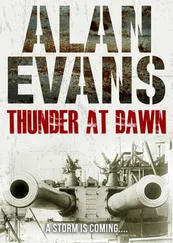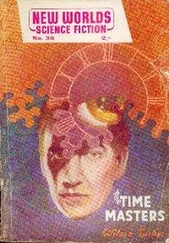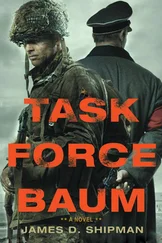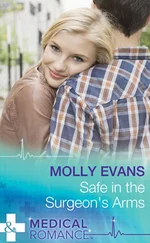On again with the squish and slither of their boots in the mud at the side of the road, the sound of their breathing and the tinkling trickle of a score of water courses. Josef in the lead, then Smith, McGraw, Galt, Finlay and Buckley at the tail. Until Josef stopped again and whispered, “The village.”
Smith changed the Webley to his left hand and wiped the sweat from the right on his jacket.
There were lights, only three or four of them and giving little away, but lights all the same. The enemy could show them here; the village was a long way behind the line. Smith could make out buildings, the hard edges of roofs and walls where they stood among the softer lines of trees.
Josef whispered, “There is a patrol in the village. A non-com and two men.”
Smith nodded.
Josef moved on until the village opened up. The road ran between houses into a square. They passed between the houses, hugging the wall on their left and came to the square, stopped at the corner of the last house. Smith stood at Josef’s shoulder. The square was maybe three times the width of the road that ran through it, past a fountain that was not playing, and on out of the farther side of the square. The guard-post was obvious where it lay to the left, facing the square. It was a middle-sized house with a flagpole on its roof but no flag now. A short flight of steps led up to the front door and sentries stood on either side of the door in the shelter of the apron that projected out over the steps. Their rifles were slung on their shoulders. No one could enter the square without being seen.
Smith whispered, “What about the back?” There was a light behind the front door that showed in a thin crack at its foot and another in the room above the door. The window was curtained but a sliver of light showed at one side.
They turned, retraced their steps past the houses, climbed a low wall and trudged through a garden. Liquid mud sucked briefly and smellily at their boots as they passed a pig-sty and there was a rustling and grunting. They turned right round the back of the houses, came on a path, followed it.
Josef turned and waved frantically, ran crouching off the path and bellied down. They followed him and lay pressed against the wet earth, wet grass on their faces. Now they could hear the patrol pacing steadily, unhurriedly along the path. There was a mutter of voices that grew louder as the tramp of the boots grew louder. The voices were bored, soldiers trudging through a wet night, not for the first time, nor the last. They were passing…
They stopped.
Smith had his face pressed in his folded arms to hide it, the Webley under his chest. He peered up under his brows and saw the three soldiers close, winced as a match was scraped and the glare set him blinking, saw the man with the match hold it to the pipe, his cheeks sucking. The match went out, the pipe glowed then was cupped in one hand.
One of them spat out into the darkness and it landed before Smith’s face.
Then they tramped on, out of sight and sound.
Josef got to his feet and Smith and the others followed him in file as he went along the path, moving more quickly now with the patrol behind them. So that they nearly ran into the sentry. They had come to a chest-high wall and Josef started to follow it then dropped down on all fours, pressed in tight against it. Smith, kneeling behind him, saw above the wall the head and shoulders, the rifle barrel, the flat round cap and caught a glimpse of the face below it, the round lenses of spectacles above a big moustache. Smith could see him against the glow of light in the building behind him but Smith and his party had moved against a background of trees, otherwise the sentry must have seen them. He passed them, his boots crunching on gravel on the far side of the wall, turned and passed them again, his back to them as he paced back along his beat. That beat was the length of the wall that was some fifty feet long with the break of a gate at its centre. He paced along the inside of the wall and they, crouching, tip-toed behind him outside.
The wall bounded the yard of the guard-house and that was about fifty feet square. At the head of it stood the house and there was an uncurtained window. Through it Smith could see a long room that ran the width of the ground floor. It was a dormitory with beds down each side and men sprawled on them fully-dressed. Rifles stood in racks in the aisle between the rows of beds. All this he saw by the light of the lamp that stood on the table in the middle of the room and half-a-dozen men sat there playing cards.
A sentry stood by the back door of the house, his back propped against the wall, clasped hands holding the muzzle of the rifle, its butt resting between his feet.
Smith went down again with the rest of them. The sentry was coming to the end of his beat. He turned and passed them, the crunch of his boots fading. Smith saw Josef’s face turned pale towards him as he watched the sentry then he rose and moved on. He did not halt until they were well clear of the wall and then he looked at Smith. “Well?”
The back of the house was as hopeless as the front. They could do nothing. It had been a dangerous waste of time and they had a long way to go to get back to the ship. He looked at his watch and saw that forty-five minutes had passed since he sent Lorimer away and embarked on this folly. He had made a fool of himself and all of them would know it and Trist would smile. All for a woman just because she was a woman. Or was it because Buckley and the men expected him to perform some miracle and his vanity had led him to try?
They stood around him with their shoulders hunched against the rain, heads turning as they quartered the darkness but they shot quick glances at him. The carrot-headed Hec McGraw, and Galt, the mouth-organ playing tough. Dour Finlay and Buckley. He would have to tell them it was no good. He had risked their lives for nothing.
He asked, “Where does the path go?”
Josef shrugged. “I don’t know but I suppose it runs into the road again on the far side, the inland side of the village.”
“We’ll keep on, then.” Something nagged at him, something he should have thought of, that had eluded him so that he went over in his mind what he had seen, looking at it again as they walked on through the night, following the path as it bent slowly to the right. He recalled the road running between the houses and the sentries at the front of the house, at the rear. The wandering patrol. The single light on the upper floor suggested the woman might be there. Might? The square was empty so maybe the transport had not arrived and she was in there somewhere. It was too soon for the transport to have come and gone and surely they would have heard it, seen its lights — That was it !
He heard it then, and saw its lights as the factor that had eluded him snapped into place. The lights were moving, he could see them through the trees that ran in a line that marked the line of the road and he could hear the engine. The vehicle was about four hundred yards away and he was twenty yards from the road.
He started to run and shoved past Josef. “ Come on!” He called it, not shouting but loud enough for all of them to hear and their boots pounded and splashed behind him. He made out two low gaps in the hedge and broke from the path that meandered on and ran straight through the long grass at one of the gaps and jumped it. He landed in the ditch beyond in a fountain of spray that stank and knee deep in water, fell forward, recovered and splashed out of the ditch and ran along the road towards the approaching lights. There were splashings and muttered curses in Scots accents and Buckley’s hoarse chiding: “Shut that gab! Save your breath!”
They needed it. Smith was already panting but he kept on running as the lights came towards him. Two hundred yards away? He stopped and dragged his torch from his pocket, switched it on and shoved it at Josef. “Get in the road and stop him!” And crouched in the ditch, the water up to his middle, waved down the others as Josef stood on the crown of the road and waved his torch at the vehicle lumbering down on him.
Читать дальше












